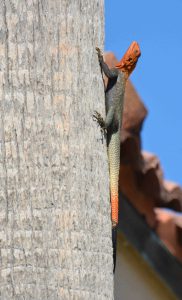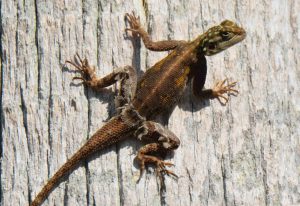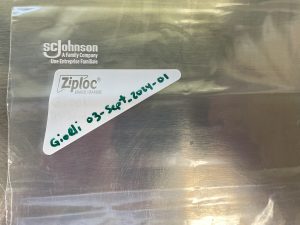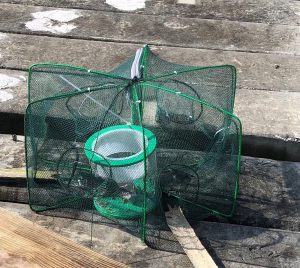
4-H Agamapalooza Citizen Science Project Educational Objectives
The UF/IFAS Extension St. Lucie County, in conjunction with the UF/IFAS Croc Docs, will be conducting the 4-H Agamapalooza Citizen Science Project in September 2024. This event is for youths ages 8-18 and will begin with an orientation on September 3, 2024 at 6:30 PM and conclude on September 30, 2024. There will be no in-person requirement; however, we are asking participants to turn in their agama specimens at the conclusion of the event. This event is currently full with an extensive waitlist.
Peters’s rock agama are nonnative reptiles introduced to the Treasure Coast via the pet trade in 1976. Since then, their population has expanded. Basic information about this species is needed for their management. This 4-H event will involve work with local youths interested in developing an effective trapping system while collecting agama biometric data for the UF Croc Docs. This will be a competitive event with the coveted Golden Lizard first prize (its a spray-painted lizard model) and certificates awarded in winning youth categories.
Youth ages 8-18 will (1) increase their knowledge of invasive and nonnative reptiles such as Peters’s rock agama; (2) create their own live trap while avoiding re-release of Peters’s rock agama into the Florida environment; and (3) learn to record citizen science-related data on specimens collected.
4-H Agamapalooza Rules and Procedures
These three items will be considered in final judging and must be received by the UF/IFAS Extension St. Lucie County by no later than 4:00 p.m. on September 30, 2024. UF/IFAS Extension St. Lucie County, 8400 Picos Road, Fort Pierce
- Completed data sheets.
- Description and photos of trapping process turned in on the Trap Data Sheets
- Agama specimens
All applicable UF/IFAS, 4-H, St. Lucie County rules and regulations will be followed. The live trap design must not violate animal cruelty laws. Kill traps are not permitted. Participants must get permission of the property owner before trapping on other’s property. Supervising adult and youth participants will comply with Florida Fish and Wildlife Conservation Commission rules.

Credit: Pam Harting, Florida Master Naturalist
FAQ
A list of frequently asked questions is now available. https://bit.ly/3TcpITy
Data Sheets
Participants will collect the following data on Peters’s rock agama captured in their traps: location, size, sex, snout-to-vent length, tail circumference, tail regeneration and other information. This information will better help biologists understand agama biology, methods to strengthen removal efforts, and examine impacts.
Data Sheets Versions: Word .doc | pdf. | Excel
Agama Traps
Participants will submit photos and specifications on the agama live traps they develop. Fishing lures, modified bait fish traps and other methods are permitted. No pellet guns, bb guns, blow dart guns or other projectile weapons will be used. Although effective, the purpose of this program is to develop a live trap. Traps cannot cause harm to the agama. They should be checked daily. Neither trap or the trapped agamas should be in direct sunlight. Once trapped, agama should be stored individually in a cloth sack (like a pillowcase) and placed in the shade.
Trap Data Sheet Versions: Word.doc | .pdf
Specimen Check-in Options
The Florida Fish and Wildlife Conservation Commission does not permit captured agamas to be re-released into the Florida environment. UF/IFAS Extension Agents will follow the two-step process for this citizen science project as required by FWC. This process is described on this website: https://bit.ly/46GB6fV
Option 1 – In-person live agama drop-off procedure
This is the preferred method. Participants can drop off their live agama and data sheets on Mondays and Thursdays from 4-5 P.M. at the UF/IFAS Extension St. Lucie County, 8400 Picos Road, Ste 101, Fort Pierce, FL 34945. If live agamas are expected to be held for 24 hours or more before dropping off, they should be kept individually (to keep data organized and to prevent stress). The agamas should be given food and water as needed, and ensure they are in individual, secure, breathable sack or container/cage (not a plastic storage bag) of adequate size. Extension Agents will follow the FWC required two-step process afterwards.
Option 2 – Alternate in-person specimen drop-off procedure
If participants are not able to drop off their live agama in-person, supervising parents/adults with or without the presence of the youth participants should follow the FWC-required two-step process and be responsible for keeping the processed specimens refrigerated or frozen to avoid spoiling. This two-step process is listed in the AMVA Guidelines-on-Euthanasia-2020.pdf (avma.org). These specimens can be turned in by September 30th at 4 p.m. at the UF/IFAS Extension St. Lucie County, 8400 Picos Road, Ste 101, Fort Pierce, FL 34945. Participants are asked to label plastic storage bags using a sharpie with date, collector, location/coordinates. Each agama specimen should be stored in a separate plastic storage bag. If more than one is captured during a day and the FWC two-step process is used, label the in-take storage bag with date followed by a number for the captured individual (i.e., 23_Sept_2024_01).

Option 3 – Overnight shipping
If participants are at a distance and are not able to drop off their agama in-person, supervising parents/adults with or without the presence of the youth participants should follow the FWC-required two-step process and be responsible for keeping the processed specimens refrigerated or frozen to avoid spoiling. These specimens can be shipped and received by no later than September 30th at 4 p.m. at the UF/IFAS Extension St. Lucie County, 8400 Picos Road, Ste 101, Fort Pierce, FL 34945. Use freezer packs to keep the agama specimens from spoiling and use overnight shipping. The Extension office is not open on the weekends, so please make sure your specimens are set to arrive on a day we are open. Participants are asked to label plastic storage bags using a sharpie with date, collector, location/coordinates. Each agama captured during this process should be stored in a separate plastic storage bag. If more than one is captured during a day and the FWC two-step process is used, label the in-take storage bag with date followed by a number for the captured individual (i.e., 23_Sept_2024_01). Check with your local courier or post office if you have questions about shipping.

FAQ
A list of frequently asked questions and responses is now available.
Social Media
While we understand that all of us live in an interconnected modern society, we are asking participants to avoid posting social media posts depicting agama trapping or handling in a way that could be seen as cruel. We will disqualify any participants shown mishandling any animal in a cruel manner.
Waivers and Releases
Liability waivers and photo releases are due at the UF/IFAS Extension St. Lucie County, 8400 Picos Road, Ste 101, Fort Pierce, FL on August 28, 2024. These can be mailed, dropped off or emailed. If emailed, please send to Ken Gioeli, ktgioeli@ufl.edu
Liability Waivers | Photo Release
For additional information
What: 4-H Agamapalooza Citizen Science Project for Ages 8-18
Hosts: Ken Gioeli & John Ferguson, UF/IFAS Extension St. Lucie County
When: Begins September 3, 2024. Concludes by September 30, 2024.
Where: Hybrid format. Zoom orientation. Agama specimen will be dropped off in-person at the UF/IFAS Extension St. Lucie County, 8400 Picos Road, Fort Pierce
Registration: Full. There is a waitlist. https://bit.ly/3WO28hY
Sponsor the 4-H Agamapalooza Citizen Science Project https://bit.ly/46Dtx9B
References
Florida Fish and Wildlife Conservaiton Commission (FWC). https://bit.ly/46GB6fV
Gioeli, K. and Johnson, S. 2020. Peters’s rock agama in Florida. [UF EDIS]
Gioeli, K. (2024, September 4). 4-H Agamapalooza FAQ. [UF Blog] https://bit.ly/3TcpITy
An Equal Opportunity Institution. UF/IFAS Extension, University of Florida, Institute of Food and Agricultural Sciences, Andra Johnson, Dean and Director. Single copies of UF/IFAS Extension publications (excluding 4-H and youth publications) are available free to Florida residents from county UF/IFAS Extension offices.
 0
0
